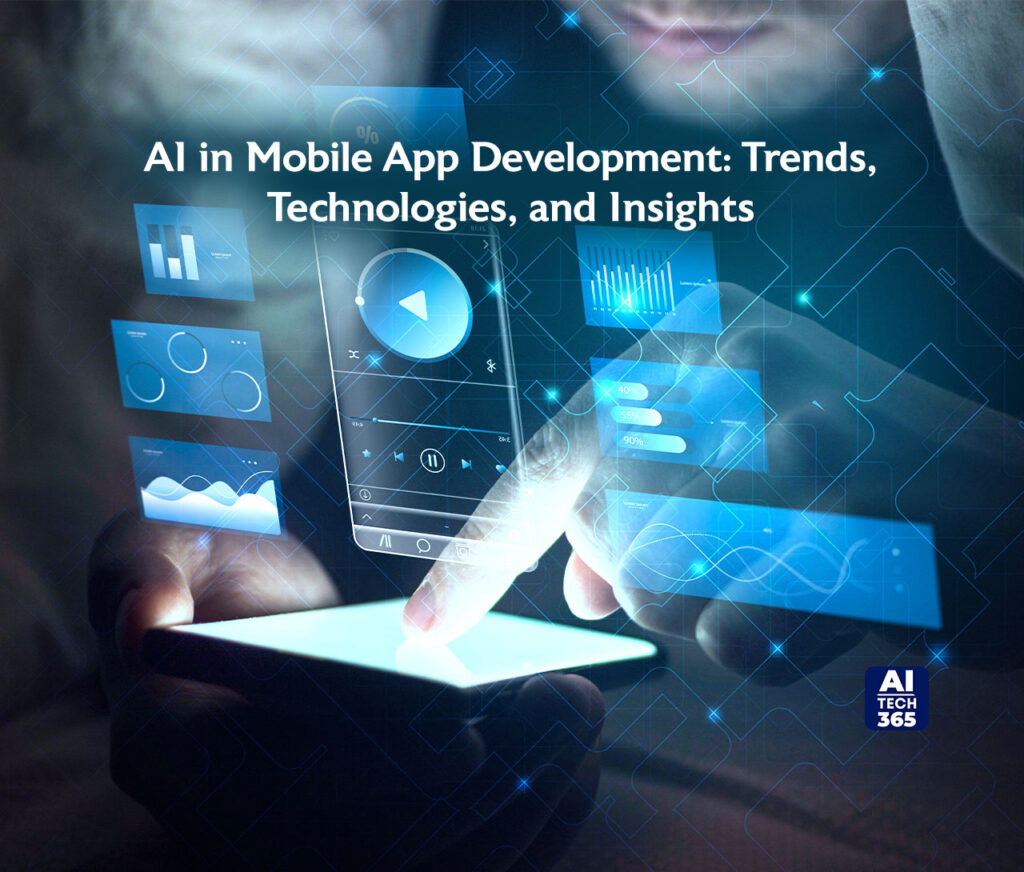In the ever-evolving landscape of mobile app development, one technological powerhouse stands out: Artificial Intelligence (AI). As smartphones become increasingly integral to our daily lives, developers are leveraging AI in mobile app development to create smarter, more intuitive applications.
As the Android and iOS platforms are inundated with more than 8 million applications, users are increasingly demanding enhanced experiences, prompting developers to seek inventive methods to improve user satisfaction and stay ahead in a fiercely competitive mobile app market. This is where AI steps into the spotlight. According to IBM’s Global AI Adoption Index for 2022, 77% of companies are currently employing or considering the adoption of AI.
Let’s take a closer look at different ways to integrate AI in developing mobile applications.
Introduction of AI in Mobile App Development
With the progression of technology, artificial intelligence started integrating into the realm of mobile application development. This integration opened up innovative opportunities for enterprises with mobile applications and developers.
The emergence of artificial intelligence (AI) has ushered in a new era, providing developers with the opportunity to develop smart applications capable of adjusting, acquiring knowledge, and implementing data-driven choices. AI algorithms have facilitated the enhancement of user interactions, tailored suggestions, voice recognition, and predictive analysis. This advancement has led to a significant transformation in the functionalities of mobile applications.
The Promise of AI in Mobile App Development
Let’s explore the three primary advantages that AI offers when integrated into the development of mobile applications.
● Enhanced User Experience
AI enhances user and customer interactions within your solution by making them more intuitive, ultimately resulting in a personalized experience. Through intelligent algorithms, AI enables sentiment analysis and emotion identification, creating avenues for enhancing services and products.
● Automated Operations
The integration of AI in mobile app development that serves as a valuable extension to enterprise software plays a crucial role in streamlining routine business operations, thereby diminishing manual interventions and automating monotonous tasks. Consequently, this automation eradicates potential errors, ensuring a precise outcome, an aspect of utmost significance, particularly in data-related contexts.
● Increased Efficiency
Generally, AI in mobile app development facilitate the execution of tasks at a swifter pace compared to human capabilities. Be it handling data processing, addressing customer inquiries, or streamlining operational procedures, artificial intelligence serves as a valuable resource for businesses seeking heightened operational efficiency.
If artificial intelligence (AI) has the capacity to enhance automation, elevate user experience, and provide intelligent interactions, it can extend these benefits beyond web applications to mobile platforms as well. Whether it’s chatbots, digital assistants, personalized experiences, or improved security measures, the potential applications of AI in mobile app development are diverse.
7 Effective Ways to Utilize AI in Mobile App Development
Artificial intelligence (AI) technologies are revolutionizing mobile app development, offering developers tools to enhance products, expand app functionalities, and elevate user experiences. Yet, the impact extends further. Through automating repetitive tasks, AI accelerates the creation and enhancement of applications, saving valuable time and resources. Here are some specific examples showcasing how AI can be seamlessly integrated into mobile app development processes.
1. Speech Recognition Technology (Natural Language Processing)
NLP technology empowers the comprehension and interpretation of human language, forming the foundation for voice assistants.
Take Google Assistant, for instance; it transcribes user speech, crafts voice responses, and even adds a touch of humor or entertainment. This application adeptly handles voice commands, allowing users to seamlessly control integrated devices like kettles or TVs with simple verbal instructions.
2. Intelligent Chatbots
Just a few years ago, employees handled incoming customer messages. Now, AI-driven chatbots manage this task. Companies are adopting this technology to enhance user experience and streamline operations. Chatbots swiftly address inquiries, including offering medical advice, impressing users with their immediacy.
Moreover, their cost-effectiveness is a boon for business owners, sparing them from hefty investments in support departments or call centers. Instead, they opt for the more economical development of chatbot solutions.
3. Image Recognition & Object Detection
Artificial intelligence taps into diverse databases, swiftly analyzes information, and delivers highly accurate results. Where can you leverage this AI capability?
- Person identification.
- License plate recognition for vehicles.
- Disease diagnosis in healthcare.
- Assessing damage in insurance claims.
- Converting handwritten text into digital documents.
This AI technology finds widespread application in developing security-related applications, particularly for facility security purposes. For instance, such systems can swiftly and accurately identify intruders, such as criminals breaking into a bank.
4. Recommendation & Personalization Engine
Numerous renowned companies such as Spotify, Amazon, and Netflix have successfully leveraged AI technology to their advantage, resulting in substantial financial gains.
What purpose does it serve? The recommendation system operates on a simple principle. It assesses the user’s queries and preferences and suggests content based on those. For instance, when you listen to your preferred music on Spotify, the system identifies and recommends similar tracks to you, prompting curiosity about how it accurately gauges your tastes.
5. Content Generation
Artificial intelligence has advanced to the point where it not only processes data but also creates content. Its capabilities include image creation, text generation, grammar and spelling checks, and more.
Which individuals would find these AI features advantageous? Primarily, software tools incorporating content generation capabilities are applicable to professionals such as marketers, writers, social media managers, designers, copywriters, among others. Undeniably, AI cannot entirely substitute human input; however, it is firmly believed that it facilitates streamlining the tasks and workload of experts.
6. Digital Assistance
Siri, Amazon Alexa, or other Google Assistant have the ability to streamline users’ daily routines by carrying out various tasks such as browsing the web for relevant information and controlling home appliances.
Digital assistants possess the ability to not just receive and comprehend voice instructions but also to generate them. An application featuring a virtual assistant can assist in overseeing personnel on the trading floor. Presently, major corporations employ these assistants to provide guidance to their clientele.
7. Predictive Analytics
Effective analytics play a crucial role in the smooth functioning of every enterprise. Leveraging artificial intelligence technologies can simplify this process by enabling accurate forecasting of customer behavior through a thorough analysis of their historical interactions. AI excels in speed and precision, delivering trustworthy outcomes essential for informed decision-making.
The Evolution of AI in Mobile App Development: Forecasts for 2024
What lies ahead for AI in mobile app development remains an open-ended question with boundless opportunities.
Artificial intelligence is poised to revolutionize the mobile application sector significantly, impacting various aspects. By automating mundane activities and redefining user engagements, AI holds the promise of reshaping how individuals engage with mobile applications. This advancement will grant developers access to advanced resources and structures that can expedite the application creation journey, enhancing both productivity and affordability.
However, great power comes with great responsibility. It is imperative to tackle ethical considerations and hurdles related to AI in mobile app development. Establishing transparency, safeguarding data confidentiality, and upholding impartiality in algorithm-driven choices are essential components for fostering user confidence.
Final Thoughts
The integration of AI in mobile app development is a lasting trend. Key advancements such as predictive analytics, strengthened security protocols, AI-driven virtual assistants and chatbots, and upcoming innovations merely scratch the surface. With the advancement of AI technologies, the prospect of developing exceptionally customized and smart mobile applications becomes increasingly appealing.
AI’s impact on the mobile app industry is significant, ranging from improving user experiences, enhancing app performance, to strengthening security protocols. Looking ahead, it is clear that AI will play a pivotal role in driving innovation, leading to promising developments and creating fresh opportunities for both mobile app developers and users.

